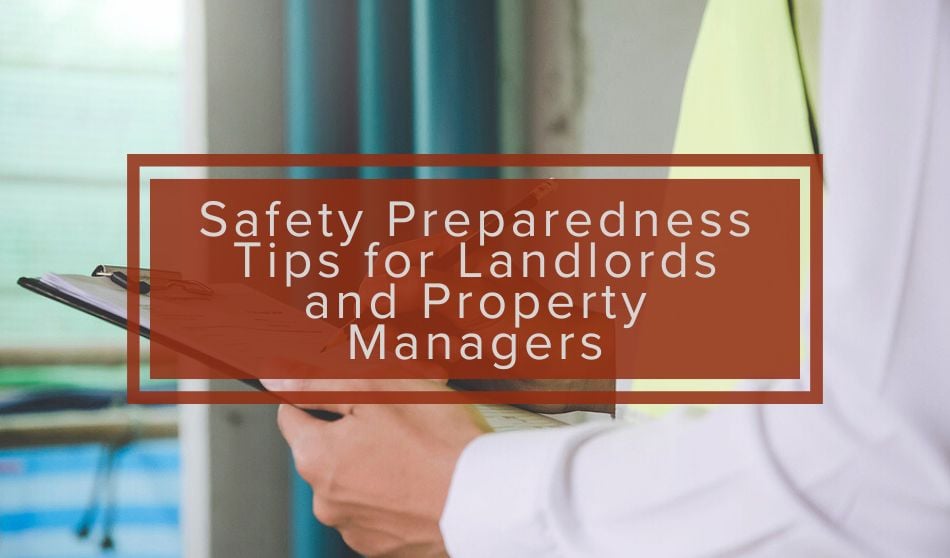
September is National Preparedness Month, which shouldn’t apply to just homeowners. Preparedness is important in all aspects of life from work to home and in-between; for landlords and property managers preparedness and safety steps can look a little different, but are no less essential.
From following vital preparedness tips for landlords and property management teams, to passing along crucial information to your owners for their properties, to ensuring renters have the emergency information they need, there are a few things you will absolutely want to check off your preparedness checklist this month.
Personal Preparedness and Safety Information for Real Estate Professionals
When real estate professionals think of preparedness and safety it’s easy to automatically consider the concerns of your clients and tenants. After all, a great property manager or landlord is continually monitoring for maintenance issues or general safety concerns to ensure the tenant’s space is habitable and welcoming.
Unfortunately, for those with occupations in the real estate industry, from sales to property management, there are inherent risks to health and safety. These personal safety concerns for landlords, managers and their teams should not be overlooked.
In the rental industry, there are a few examples of daily tasks that may create safety risk. While not a comprehensive list, this can include:
- In-person showings
- Cash payments/deposits
- Rental inspections
- Angry tenants
- Dogs and dangerous pets
- Winter darkness
- Evictions
- Rent collections
- Rentals with tenants who hoard
- Rentals used for drug deals and meth houses
Not all of these situations are inherent safety risks, and many of the inherent risks on the list occur very infrequently, but there are cases of dangerous people causing safety risks for real estate professionals, and it pays to be aware and prepared. Simple tips like avoiding sharing personal information, being alert when traveling, inspecting, or showing rentals, and getting the police involved if there is ever evidence of a threat or safety concern are all ways to mitigate risk to yourself and your team.
Want more tips? Learn more: Personal Safety Tips for Landlords, Property Managers & Real Estate Professionals
Annual Preparedness Tips for Landlords and Rental Properties
Preparedness comes in a variety of forms, and will look different throughout the year. However, there are key areas where safety plans and checklists are essential to maintain habitability, mitigate threats, and create a failsafe in the event of an emergency.
General Property Safety:
Rental property owners and managers are responsible for providing a safe and habitable conditions for their tenants, and rental safety checks are an essential part of maintaining this habitable environment. These annual inspections can also ensure that you are keeping the property at its best, minimizing damage and long-term issues before they have a chance to occur.
Annual safety inspections should include a review of three key property features:
- Interior Safety Check
- Appliance Safety Check
- Exterior Safety Check
Regular property inspections will keep tenants safe and allow you to identify problems before they become expensive repairs, so be sure to schedule regular safety inspections at least once a year, and again during tenant turnover.
Learn more: Safety Checklist For Rental Properties
Download a PDF Checklist: Safety Checklist For Rental Properties- Infographic
Autumn Preparedness for Landlords:
Summer through autumn is peak hurricane season, and ensuring that your tenants and your property is prepared for a hurricane will give everyone peace of mind. If you know of a storm approaching, it is a great idea to reach out to your renters to remind them of certain hurricane preparedness measures.
Tenants or managers should:
- Secure outside fixtures or fixtures bring indoors
- Ex: grills, patio furniture, ect.
- Remove AC window units
- Clean gutters and storm drains to ensure proper drainage
Tenants should:
- Create an emergency kit
- Back up important computer files online
- Review emergency plan
- Take inventory of personal belongings for insurance
Learn more: Hurricane Safety for Landlords and Renters
Inclement weather can also bring other risks. Slips and falls can happen any time of year, but winter and autumn are particularly prone to risk. With wet and stormy weather heightening the risk of slips due to water, ice, and debris buildup, there are liability and safety concerns that landlords and property managers should be aware of during these seasons.
Fall risk prevention techniques include:
- Check railings for stability
- Texture walkways for added grip
- Clear foliage overgrowth and remove any debris from sidewalks
- Fill holes in lawn or dirt pathways
Learn more: 5 Slip Prevention Tips for Your Rental Property: Infographic
Winter Preparedness for Landlords:
Winter’s extreme weather, holidays, and shortened days can all lead to specific safety concerns. From slips and falls, holiday fire risk, to winter emergencies due to inclement weather, keeping your property safe and your tenants protected relies on key inspections and passing along helpful information to tenants.
Since winter weather isn’t kind to those who don’t prepare for it, winter demands proactive property management to ensure that your property and your tenants are prepared. Safeguard your rental by sending storm-prep emails to tenants, staying updated through alert systems, and encouraging tenants to do the same. To prep the property itself, be proactive about scheduling HVAC maintenance and insulating pipes to prevent a burst pipe.
Learn more: Is Your Rental Prepared for a Winter Emergency?
During the holidays, it’s easy to get caught up in the busy work of the season and unintentionally create fire risks. Cooking fires are the number one cause of residential fires in the United States. Big gatherings with holiday food, dry Christmas trees, and unintentional inattention can all create safety issues. On Thanksgiving Day, three times the normal average of cooking fires occur, resulting in approximately 1,700 fires. Christmas and other winter holidays also pose this same risk. Pass along decoration and cooking safety tips to renters to keep the property damage-free and prevent dangerous situations.
Learn more: Holiday Safety Tips for Your Tenants
Spring Preparedness for Landlords:
Spring showers may bring spring flowers, but it can also bring spring flooding. The Federal Emergency Management Agency (FEMA) have numberous articles discussing the need for flood insurance due to the risks of snowmelt and spring thaw. According to FEMA, floods are the most common disaster in the United States.
Be on the lookout for water damage from snowmelt, and follow any recommendations if a flood warning is in place. Aside from occupant safety, before a flood occurs, your goal is to reduce the risk of damage to structures from flooding.
Damage can be mitigated by:
- Elevating: Elevate critical utilities, electrical panels, switches, sockets, wiring, appliances, and heating systems.
- Waterproofing: Waterproof basements and areas prone to flooding.
- Using moisture alarms: Install a water alarm to let you know if water is accumulating in basement areas.
Learn more: Spring Flooding at My Rental Property
Summer Preparedness for Landlords:
With summer sun, comes summer heat, which can bring about a dry season that is rife with wildfire risk. Wildfires are becoming more newsworthy in various parts of the U.S. and taking precautions is key to mitigating damage and keeping occupaints safe.
Three key steps should be taken during wildfire season:
- Landlords and mangers should be sure to have their landscaping crews work with tenants to create a “defensible space” in accordance with fire safety guidelines.
- Smoke alarms must be tested for efficacy.
- Encourage tenants to create (or provide tenants with) a recommended fire escape route or emergency plan.
Learn more: Fire Safety for Your Rental Property
Preparedness Tips to Pass Along to Renters
Renters are also responsible for their safety and ensuring they remain prepared in the event of an emergency. Many emergency prep guidelines are specific for homeowners, and there are a few special considerations that renters may need–particularly those living in larger apartments, or for tenants with pets who are facing an emergency. Passing along a resident-specific emergency preparedness information can be helpful, consider including copies of the building evacuation plan and other pertinent information specific to your rental property.
Learn more: Emergency Preparedness Steps For Renters





